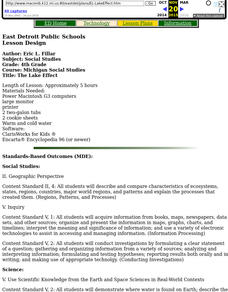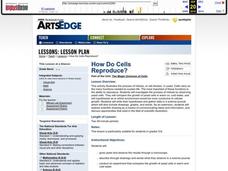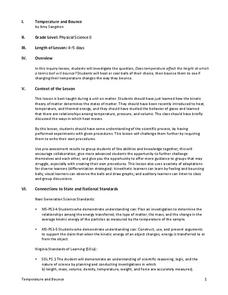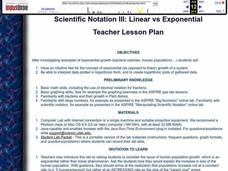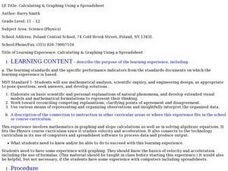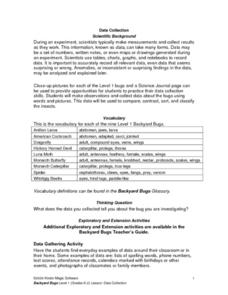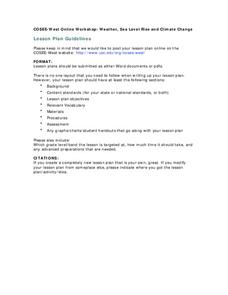Curated OER
Bird Feeding and Migration Observation
Students research bird migration and build a bird house. In this bird lesson plan, students research the birds in their area and where they migrate to. They also build their own bird house and record data on what kinds of birds come to...
Curated OER
Gravity Lesson
Fifth graders study the effects of mass on gravity. In this gravity lesson, 5th graders make model parachutes and helicopters in order to apply the scientific process and find out the effects of mass on drops of the 2 objects.
Curated OER
How Hot is Too Hot?
Fifth graders use the scientific method to conduct experiments on the temperature effects on organisms. In this temperature effects on organisms lesson plan, 5th graders observe and record the hatching or the developing of organisms into...
Curated OER
Mythbusters
Eighth graders watch an episode of Mythbusters and answer questions that arise in the video about the scientific process. In this Mythbusters lesson plan, 8th graders complete a scientific investigation based on the video.
Curated OER
Inventing and Presenting Unit 3: Persuasive Speaking and Invention Promotion
Middle schoolers write a proposal for a speech. Students prepare appropriate visuals for use in the proposed speech. Middle schoolers produce one or more graphs that summarize the results from the experimentation. Students deliver an...
Curated OER
Money Circulation: A Story of Trade and Commerce
Middle schoolers are introduced to the meaning, symbolism, and value of the quarter. They determine the percentage of total monetary value held in quarters and graph the results. Students infer about the U.S. Mint's distrubution of...
Curated OER
Supersonic Dream
Young scholars explore how fuel use affects the mass of different planes during flight and graph their results. They determine the per person fuel cost of a transatlantic flight for seven airplanes
Curated OER
The Lake Effect
Fourth graders conduct an experiment demonstrating the effects of water and air temperature on precipitation. They create graphs demonstrating their findings using Claris Works for Kids.
Curated OER
How Do Cells Reproduce?
Beginning biologists prepare a sugar solution for yeast cells to live in, and divide it into two different jars. Samples from each jar are viewed with a microscope, and then one jar is placed in a warm environment and the other a cold...
Cornell University
Mechanical Properties of Gummy Worms
Learners won't have to squirm when asked the facts after completing an intriguing lab investigation! Hook young scholars on science by challenging them to verify Hooke's Law using a gummy worm. Measuring the length of the worm as they...
Population Connection
The Peopling of Our Planet
How many people live on the planet, anyway? The first resource in a six-part series covers the topic of the world population. Scholars work in groups to conduct research and make population posters after learning about the global...
STEM for Teachers
Temperature and Bounce
Take part in a fun experiment and hold an impromptu bouncing contest with your class. Young scientists heat and cool balls before bouncing them to determine whether temperature changes affect how they bounce. The set of STEM lesson plans...
Curated OER
Scientific Notation III: Linear vs Exponential
High schoolers examine the differences in exponential growth and linear growth of a system. They interpret data on graphs and develop their own charts. They answer discussion questions as well.
Curated OER
Scientific Inquiry: Periodic Motion
Students construct their own pendulum. In this physics activity, students design an experiment to find the factors affecting its period. They formulate a conclusion based on experimental data.
Curated OER
Sun Spot Analysis
Students use Excel to graph monthly mean Greenwich sunspot numbers from 1749 to 2004. They perform a spectral analysis of the data using the free software program "Spectra". Short answer and thought questions related to the graphical...
Curated OER
Calculating & Graphing Using a Spreadsheet
Students use the lab apparatus to calculate the average velocity and average acceleration at several points and record the data. They use the spreadsheets to plot distance vs. time, velocity vs. time and acceleration vs. time graphs.
Curated OER
Science: Backyard Bugs Data Collection
Students practice data collection skills by observing common bugs found in their local environment. Once the data is collected they complete data sheets to compare, contrast, sort, and classify the insects. The lesson includes...
Curated OER
Weather Graphs
First graders use their knowledge of weather symbols to organize and construct a graph of the daily weather for one month. Each student have a chance to give the daily weather report using Sammy's Science House Computer Software.
Curated OER
Sampling Rocks
Learners examine how to take a sample by looking at rocks in the schoolyard. In this sampling lesson, students discuss ways to classify rocks by color, size, and weight. They think about how many rocks would make a good sample of...
Curated OER
Impact of Exotic Species on Lake Ecology
Students examine the effect of foreign species on various habitats. In groups, they identify the population dynamics of the zebra mussel. They calculate averages and graph data from Seneca Lake in New York. They develop hypothesis...
Curated OER
Weather, Sea Level Rise and Climate Change
Eighth graders compare and contrast weather and climate. In this earth science lesson, 8th graders research weather data site and analyze historical data. They present their findings in class and explain identifiable trends.
Curated OER
Is the Hudson River Too Salty to Drink?
Students explore reasons for varied salinity in bodies of water. In this geographical inquiry lesson, students use a variety of visual and written information including maps, data tables, and graphs, to form a hypothesis as to why the...
Curated OER
Shake, Rattle and Roll
Sixth graders explore the causes and effects of earthquakes. They also collect and analyze data in graphs. They also use the Internet to research earthquakes
Alabama Learning Exchange
Who Sank the Boat?
Fifth graders experiment with student-made aluminum boats to test for buoyancy. They design a boat and determine how many marbles it takes to sink it while recording their data in a spreadsheet. They design a graph using the data and...









